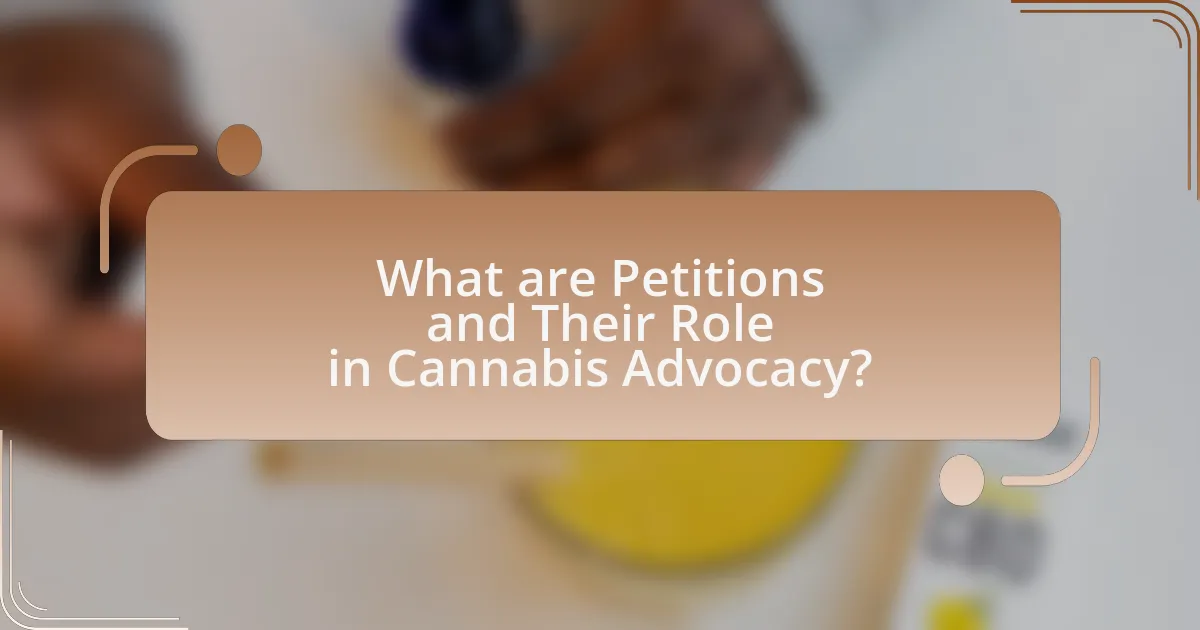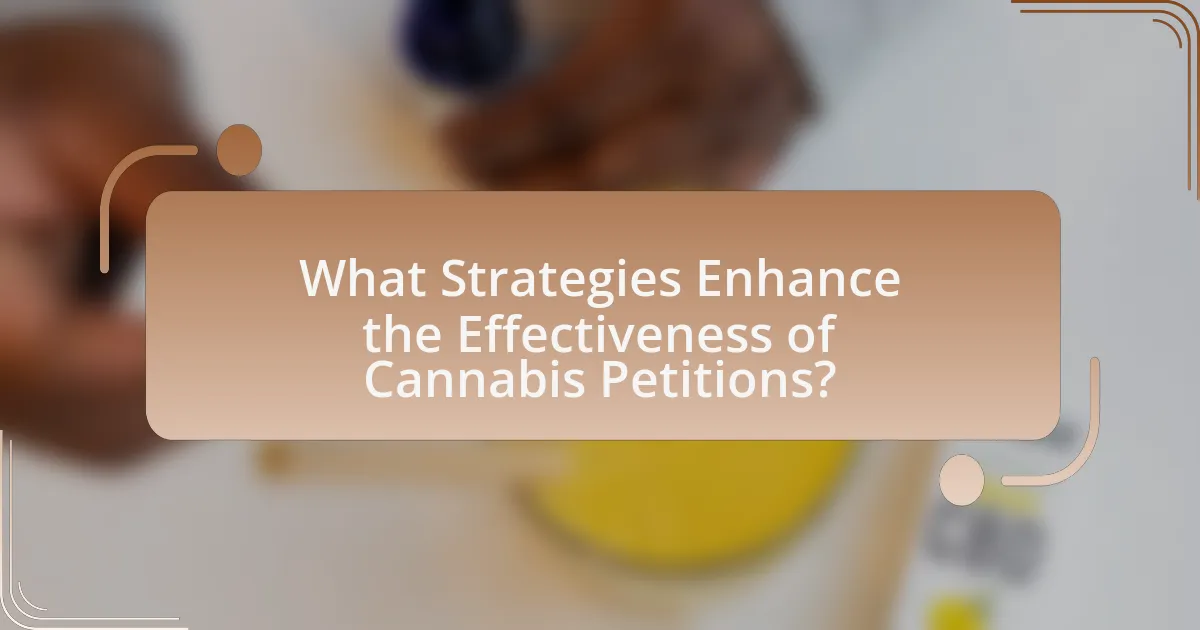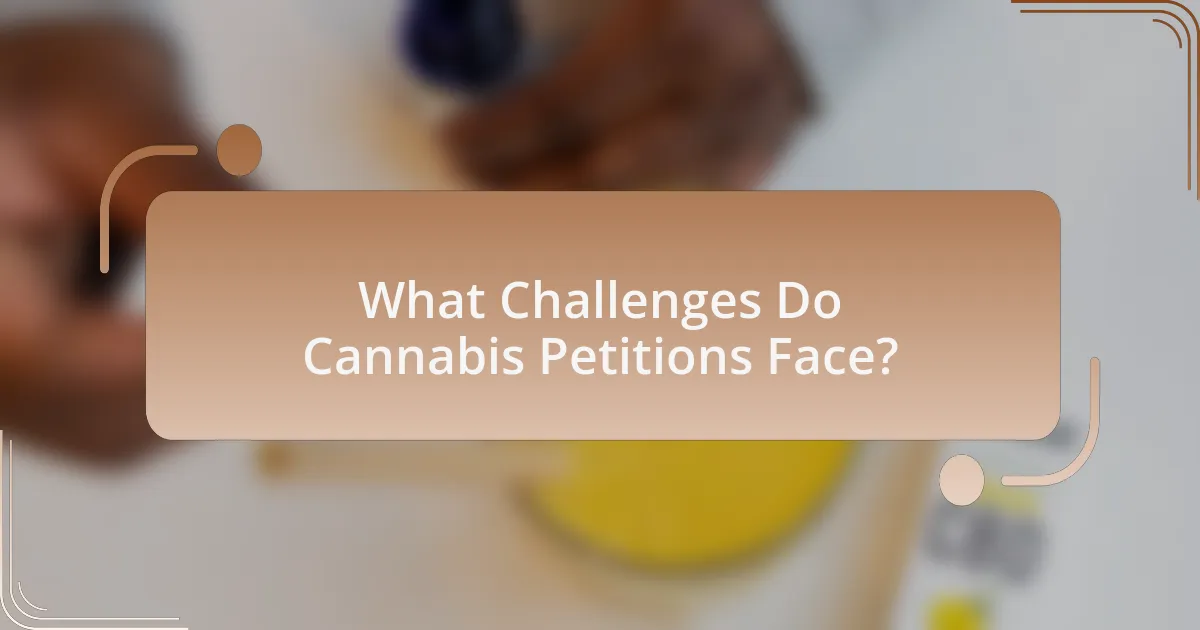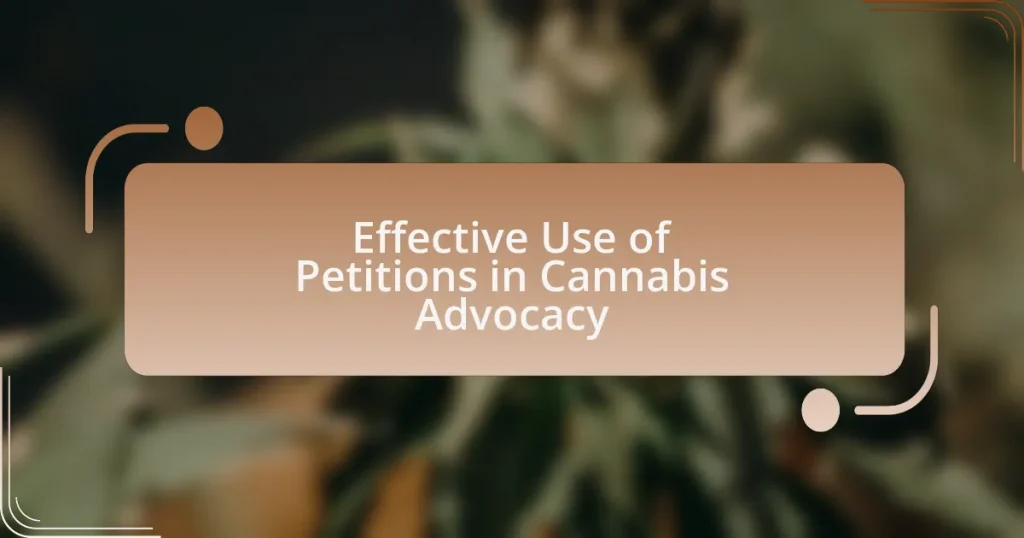Petitions are formal requests that play a crucial role in cannabis advocacy by mobilizing public support and influencing policy changes related to cannabis legalization, decriminalization, and medical use. This article explores how petitions effectively channel public opinion into political action, highlighting successful historical examples such as California’s Proposition 64 and Colorado’s Amendment 64. It discusses the types of petitions that are most effective, the impact of public perceptions on their success, and strategies for crafting compelling messages and gathering signatures. Additionally, the article addresses the challenges faced by cannabis petitions, including legal hurdles and societal stigma, while offering practical tips for enhancing their effectiveness and measuring their impact.

What are Petitions and Their Role in Cannabis Advocacy?
Petitions are formal requests signed by individuals to advocate for specific changes in laws or policies, particularly in the context of cannabis advocacy. They serve as a tool for mobilizing public support, demonstrating community interest, and influencing lawmakers to consider reforms related to cannabis legalization, decriminalization, or medical use. For instance, the Marijuana Policy Project has successfully utilized petitions to gather support for legislative changes, resulting in the legalization of cannabis in several states. This illustrates how petitions can effectively channel public opinion into actionable political pressure, thereby playing a crucial role in advancing cannabis advocacy efforts.
How do petitions influence cannabis policy changes?
Petitions influence cannabis policy changes by mobilizing public support and demonstrating demand for reform to lawmakers. When a significant number of individuals sign a petition advocating for cannabis legalization or decriminalization, it signals to policymakers that there is substantial public interest, which can lead to legislative action. For instance, the 2016 California Proposition 64 campaign, which legalized recreational cannabis, garnered over 600,000 signatures for its initiative, showcasing widespread support that ultimately contributed to its passage. This illustrates how petitions serve as a tool for advocacy, providing a measurable expression of public opinion that can sway political decisions and prompt discussions around cannabis policy reform.
What types of petitions are most effective in cannabis advocacy?
Legislative petitions are the most effective type of petitions in cannabis advocacy. These petitions directly target lawmakers to support or oppose specific legislation related to cannabis, thereby influencing policy decisions. For instance, the 2016 campaign for California’s Proposition 64, which legalized recreational cannabis, successfully utilized legislative petitions to gather support from constituents, resulting in a significant voter turnout and eventual passage of the law. Additionally, grassroots petitions that mobilize community support can amplify voices and demonstrate public demand, as seen in various states where local initiatives have led to changes in cannabis laws.
How do public perceptions of cannabis affect petition success?
Public perceptions of cannabis significantly influence petition success by shaping the level of public support and political will. When the general public views cannabis positively, petitions advocating for legalization or reform are more likely to garner widespread support, leading to increased signatures and visibility. For instance, a 2021 Gallup poll indicated that 68% of Americans support legalizing cannabis, reflecting a shift in public perception that correlates with successful legislative changes in various states. Conversely, negative perceptions can hinder petition efforts, as seen in regions where stigma surrounding cannabis remains prevalent, resulting in lower engagement and fewer signatures. Thus, the prevailing public attitude towards cannabis directly impacts the effectiveness of advocacy petitions.
Why are petitions a vital tool for cannabis advocates?
Petitions are a vital tool for cannabis advocates because they mobilize public support and influence policy change. By gathering signatures, advocates demonstrate widespread community backing for cannabis reform, which can pressure lawmakers to consider legalization or decriminalization. Historical examples, such as the successful 2016 ballot initiative in California that legalized recreational cannabis, illustrate how petitions can directly impact legislation by showcasing the electorate’s demand for change. Additionally, petitions can raise awareness about cannabis issues, educate the public, and create a sense of urgency around reform efforts, further solidifying their importance in advocacy strategies.
What historical examples demonstrate the power of petitions in cannabis reform?
The legalization of cannabis in various jurisdictions has been significantly influenced by petitions, with notable historical examples demonstrating their power. In 2012, Colorado’s Amendment 64, which legalized recreational cannabis, was propelled by a petition campaign that gathered over 160,000 signatures, showcasing grassroots support and mobilization. Similarly, in 2016, California’s Proposition 64, which also legalized recreational use, was backed by a petition that collected more than 600,000 signatures, reflecting widespread public demand for reform. These examples illustrate how organized petition efforts can effectively influence legislative change and public policy regarding cannabis reform.
How do petitions mobilize community support for cannabis initiatives?
Petitions mobilize community support for cannabis initiatives by providing a structured platform for individuals to express their collective demand for policy changes. This collective action fosters a sense of community and shared purpose, encouraging more people to engage in advocacy efforts. For instance, a study by the University of California found that petitions can significantly increase public awareness and support for cannabis legalization, as they often highlight local benefits and address community concerns. Additionally, successful petitions can demonstrate to policymakers that there is substantial public backing for cannabis initiatives, which can influence legislative decisions.

What Strategies Enhance the Effectiveness of Cannabis Petitions?
Strategies that enhance the effectiveness of cannabis petitions include clear messaging, targeted outreach, and leveraging social media. Clear messaging ensures that the petition articulates specific goals and benefits of cannabis legalization or reform, making it easier for supporters to understand and rally behind the cause. Targeted outreach involves identifying and engaging key stakeholders, such as local lawmakers and community leaders, who can influence public opinion and policy decisions. Leveraging social media amplifies the petition’s reach, allowing advocates to mobilize supporters quickly and share updates, which can lead to increased signatures and visibility. Research indicates that petitions with a well-defined purpose and strong community backing are more likely to succeed in achieving their objectives.
How can advocates craft compelling petition messages?
Advocates can craft compelling petition messages by clearly articulating the issue, presenting a strong emotional appeal, and providing specific calls to action. A well-defined issue helps the audience understand the urgency and importance of the petition, while emotional appeals can resonate with potential supporters, making them more likely to engage. For instance, statistics show that petitions with personal stories or relatable experiences increase signature rates by up to 20%. Additionally, a clear call to action, such as urging signers to share the petition on social media, enhances visibility and support.
What elements make a petition resonate with signers?
A petition resonates with signers when it is clear, emotionally compelling, and relevant to their values or interests. Clarity ensures that the purpose and demands of the petition are easily understood, which increases the likelihood of engagement. Emotional appeal, such as personal stories or impactful statistics, can motivate individuals to support the cause, as evidenced by research indicating that emotionally charged messages are more likely to be shared and acted upon. Relevance to the signers’ values, such as social justice or health benefits related to cannabis, creates a personal connection, making them more inclined to sign. For instance, a petition highlighting the medical benefits of cannabis for patients can resonate strongly with individuals who prioritize health care reform.
How important is the clarity of the petition’s goal?
The clarity of a petition’s goal is crucial for its effectiveness. A clearly defined goal helps to mobilize support, as it allows potential signers to understand the specific issue being addressed and the desired outcome. Research indicates that petitions with clear objectives are more likely to garner signatures and achieve their intended impact, as evidenced by a study published in the Journal of Public Policy, which found that clarity in messaging significantly increases public engagement and response rates. Therefore, a well-articulated goal is essential for the success of petitions in cannabis advocacy.
What are the best practices for gathering signatures?
The best practices for gathering signatures include clearly defining the purpose of the petition, ensuring the petition is easily accessible, and engaging with potential signers effectively. Clearly stating the petition’s goal helps individuals understand its importance, which can increase their willingness to sign. Accessibility can be enhanced by providing both physical and digital options for signing, allowing for a broader reach. Engaging with potential signers through personal interactions, social media outreach, and community events fosters a connection that can lead to higher signature rates. Research indicates that petitions with clear messaging and personal engagement can significantly increase participation, as seen in various advocacy campaigns.
How can online platforms be utilized for signature collection?
Online platforms can be utilized for signature collection by providing accessible and user-friendly interfaces that facilitate the gathering of digital signatures for petitions. These platforms, such as Change.org and Care2, allow users to create petitions, share them via social media, and collect signatures from a broad audience, significantly increasing outreach and engagement. Research indicates that online petitions can garner thousands of signatures in a short period, demonstrating their effectiveness in mobilizing support for causes, including cannabis advocacy. For example, a study by the Pew Research Center found that 69% of Americans support legalizing cannabis, highlighting the potential for online platforms to amplify advocacy efforts and gather substantial public backing.
What offline strategies can maximize signature outreach?
To maximize signature outreach, organizations should implement community engagement events, such as town hall meetings and local festivals, where they can directly interact with potential signers. These events create opportunities for face-to-face conversations, allowing advocates to explain the petition’s importance and answer questions, which can significantly increase participation. Research indicates that personal interactions can enhance trust and commitment, leading to higher signature collection rates. For instance, a study by the University of California found that in-person outreach efforts can yield up to 50% more signatures compared to online methods.

What Challenges Do Cannabis Petitions Face?
Cannabis petitions face significant challenges, primarily due to legal restrictions and societal stigma. Legal barriers arise from varying state and federal laws regarding cannabis, which can hinder the petition process and limit public support. For instance, in the United States, the Controlled Substances Act classifies cannabis as a Schedule I substance, complicating advocacy efforts. Additionally, societal stigma surrounding cannabis use can lead to public resistance, making it difficult to gather signatures and support for petitions. Research indicates that public perception of cannabis remains polarized, which can directly impact the effectiveness of advocacy initiatives.
What legal hurdles must cannabis petitions navigate?
Cannabis petitions must navigate several legal hurdles, including compliance with state and federal laws, gathering sufficient signatures, and addressing potential opposition from regulatory bodies. Compliance is critical as cannabis remains illegal at the federal level in the United States, creating a complex legal landscape that varies by state. For instance, states like California have specific regulations governing the petition process for cannabis legalization, requiring a certain number of valid signatures from registered voters within a designated timeframe. Additionally, petitions may face challenges from local governments or law enforcement, which can complicate the approval process. These legal requirements and potential obstacles necessitate careful planning and adherence to legal standards to ensure the success of cannabis advocacy efforts.
How do varying state laws impact petition processes?
Varying state laws significantly impact petition processes by establishing different requirements for signature collection, submission deadlines, and approval criteria. For instance, some states mandate a specific number of signatures from registered voters within a designated timeframe, while others may have more lenient or stringent thresholds. Additionally, laws may dictate whether electronic signatures are permissible, which can affect the efficiency of gathering support. In states like California, the process is streamlined with clear guidelines, whereas states like Florida impose stricter regulations that can hinder the petitioning efforts. These legal frameworks directly influence the feasibility and success of cannabis advocacy initiatives, as they determine how easily advocates can mobilize public support and navigate the bureaucratic landscape.
What are the common misconceptions about cannabis petitions?
Common misconceptions about cannabis petitions include the belief that they are ineffective in influencing legislation, that they only serve to gather signatures without any real impact, and that they are primarily used by fringe groups rather than mainstream advocates. Research indicates that well-organized petitions can significantly sway public opinion and legislative action; for instance, a study by the National Conference of State Legislatures found that grassroots efforts, including petitions, have played a crucial role in the legalization of cannabis in several states. Additionally, many people assume that petitions are only relevant at the local level, while in reality, they can also affect state and national policies, as seen in the successful campaigns for cannabis reform in states like California and Colorado.
How can advocates overcome opposition to cannabis petitions?
Advocates can overcome opposition to cannabis petitions by employing strategic communication and community engagement. By clearly articulating the benefits of cannabis legalization, such as economic growth and public health improvements, advocates can address misconceptions and fears. Research indicates that states with legalized cannabis have seen significant tax revenue increases; for example, Colorado generated over $1.7 billion in tax revenue from cannabis sales between 2014 and 2021. Additionally, building coalitions with diverse stakeholders, including healthcare professionals and business leaders, can enhance credibility and broaden support. Engaging in grassroots campaigns that involve community members can also create a sense of ownership and urgency, making it harder for opposition to dismiss the petitions.
What strategies can be employed to counteract misinformation?
To counteract misinformation, strategies such as fact-checking, promoting media literacy, and utilizing social media responsibly can be employed. Fact-checking involves verifying claims through credible sources, which helps to clarify inaccuracies. Promoting media literacy equips individuals with the skills to critically evaluate information sources, reducing susceptibility to false narratives. Additionally, utilizing social media responsibly by sharing verified information and engaging in constructive dialogue can help mitigate the spread of misinformation. Research indicates that misinformation can significantly influence public perception, making these strategies essential for effective communication, particularly in advocacy contexts like cannabis legalization.
How can building coalitions strengthen petition efforts?
Building coalitions can significantly strengthen petition efforts by uniting diverse groups with a common goal, thereby amplifying their collective voice and resources. When various organizations and individuals collaborate, they can reach a broader audience, increase credibility, and mobilize more supporters. For instance, a coalition of advocacy groups in cannabis reform can pool their networks, share expertise, and coordinate outreach strategies, leading to a more effective campaign. Research indicates that coalitions can enhance the likelihood of policy change by demonstrating widespread support; a study by the Center for American Progress found that collaborative efforts in advocacy lead to a 30% higher success rate in achieving legislative goals compared to isolated initiatives.
What are the key takeaways for successful cannabis advocacy through petitions?
Successful cannabis advocacy through petitions requires clear messaging, strategic outreach, and community engagement. Clear messaging ensures that the petition articulates specific goals and the benefits of cannabis legalization or reform, making it easier for supporters to understand and rally behind the cause. Strategic outreach involves targeting the right audience, including stakeholders and policymakers, to maximize support and signatures. Community engagement fosters a sense of ownership and urgency, encouraging individuals to participate actively in the advocacy process. Research indicates that petitions with over 10,000 signatures are more likely to gain media attention and influence policymakers, demonstrating the importance of mobilizing a substantial base of support.
What practical tips can enhance petition effectiveness?
To enhance petition effectiveness, ensure clarity in your message and target the right audience. A clear and concise message helps potential signers understand the purpose and urgency of the petition, increasing their likelihood of participation. Targeting the right audience, such as individuals who are already supportive of cannabis advocacy, can significantly boost engagement and signatures. Research indicates that petitions with a specific goal and a defined audience achieve higher success rates, as seen in campaigns like the legalization efforts in various states, which utilized focused messaging to rally support.
How can advocates measure the impact of their petitions?
Advocates can measure the impact of their petitions by analyzing changes in public policy, media coverage, and community engagement following the petition’s circulation. For instance, if a petition leads to a legislative hearing or a change in local cannabis laws, this indicates a direct impact. Additionally, tracking metrics such as the number of signatures collected, social media shares, and public responses can provide quantitative data on the petition’s reach and influence. Research shows that petitions that garner significant public support often result in increased awareness and action from policymakers, demonstrating their effectiveness in advocacy efforts.


